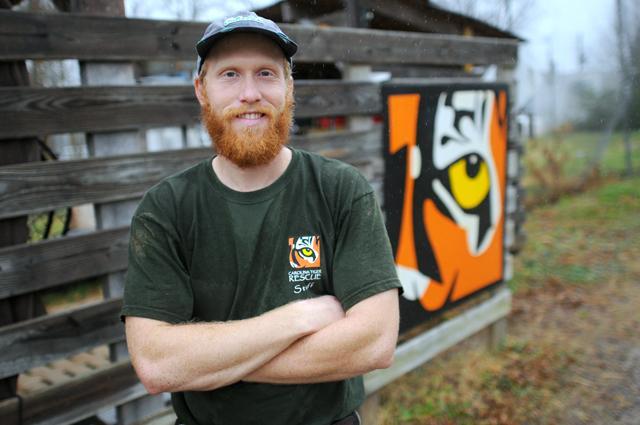Tigers may not be native to the habitat of North Carolina, but they have found a home in Pittsboro . The Carolina Tiger Rescue is a nonprofit organization and wildlife sanctuary that rescues animals, primarily wildcats, and provides conservation education to the public.
The refuge began as the Carnivore Evolutionary Research Institute, an organization founded in the 1970s by UNC-Chapel Hill geneticist Michael Bleyman and was incorporated as a nonprofit in 1981. In 2009, the organization changed its name to Carolina Tiger Rescue.
Ed Davis, who graduated from N.C. State in 2009 with a degree in Fisheries and Wildlife Sciences, grew up in Pittsboro but never expected to find a career in managing tigers until he volunteered at the rescue. Davis is now an animal keeper at the CTR .
“When I was between jobs, I decided to volunteer there and help out in construction and it turned into an externship,” Davis said. ”One day, they were looking to hire an animal keeper and the position intrigued me. I applied for it, interviewed and got the job.
David accredits his education with preparing him for the role.
“I had a really good understanding of the legislation and laws that pertain to these exotic animals because we studied them in my classes,” Davis said.
But what really inspired Dave to become a part of the Rescue was its message.
“People import tigers and other animals and we educate the public about it at the CTR ,” Davis said. ”The organization is letting people know that this is happening. It’s crazy that there are more tigers in Texas than in the wild and it’s because people want these animals as pets and are taking them out of their natural habitat. It’s detrimental to these animals native population.”
Davis’s job includes everything from food prep, changing animals’ drinking water to cleaning the enclosures. He is also involved with the volunteer program.
Brooke Waggoner, senior in zoology, is one of those volunteers. She discovered the Carolina Tiger Rescue when she was researching opportunities to work with animals. She was especially drawn to the organization because it involved exotic animals.
“I became interested on a whim,” Waggoner said. “I did some international volunteer programs growing up and some of them dealt with animals. On one of them, I worked with giant Pandas in China and another I worked with Asian elephants in Thailand. With the pandas and elephants, I helped with general care, essentially an intern zookeeper.”
Waggoner’s role at the Rescue shares similar responsibilities with Davis’s. She helps out the keeper with basic, daily activities, but her favorite part of the job is the interaction with the animals.
“We don’t go in the enclosure with the animals because it is non-touch,” Waggoner said. “But you can still have interactions behind the gates and the animals are all super charismatic. Once you’ve been there for a while, they seem to recognize you and react from you being there.”
Holly Chiswell , sophomore in marine sciences, has also volunteered at the Rescue with her service fraternity, Alpha Phi Omega.
“We were cutting pikes and setting the pikes with cement to build a new fencing area and, after all that, we took a tour,” Chiswell said. ”It was a lot of physical labor, but it was totally worth it when we got to see the tigers afterwards.”
Waggonner agreed and said the job entails a lot of hard labor.
“It’s not a very clean job,” said Waggonner . “I don’t think I’ve ever came away from volunteering without stains on my clothes or smelling like some kind of animal scent. It’s not for the meek, but it’s really great and I don’t mind doing it for the animals because the benefit from it and it’s fun for me to be around the animals.”
The greatest reward seems to be the opportunity to witness a part of nature that’s usually absent in North Carolina.








